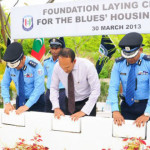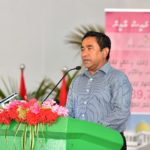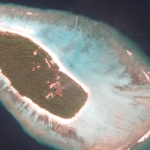The anti-graft watchdog fielded Sunday a barrage of questions on its integrity and willingness to hold President Abdulla Yameen to account over the theft of some US$80million from state coffers.
The five members of the Anti Corruption Commission, under fire for their failure to launch an inquiry when the embezzlement was first flagged in a 2014 audit report, pledged today to make public their financial and business interests.
“Our hope is that other independent institutions will follow suit,” ACC President Hassan Luthfee told the press, at a ceremony to unveil the commission’s annual report.
The watchdog insisted that it continued to have public confidence, while Luthfee maintained that his acceptance of a discounted luxury flat last year did not constitute an act of bribery.
“A lot of people raise questions saying that it is the People’s Majlis that allocates the salary and benefits for commission members. That is true. But the [flat] is not part of my salary or benefits. Me buying a thing or obtaining a service is not part of benefits,” he said.
“I bought the flat at the rate set by the government. That act does not influence my work.”
The ACC has not yet questioned Yameen over the embezzlement from the Maldives Marketing and Public Relations Corporation, he said, but added that it is willing to do so if the need arises.
Yameen has shrugged off responsibility for the MMPRC scandal, pinning the blame solely on his former deputy Ahmed Adeeb. But the main opposition Maldivian Democratic Party said some US$1million from the stolen money had been deposited in the president’s personal bank account at the Maldives Islamic bank.
The MDP yesterday requested the ACC to clarify that the inquiry into Yameen’s accounts concerned the right account. The MIB initially declined to share details, but backtracked on the orders of the president’s office.
Yameen’s admission that he receives gifts from friendly businesses for the 2018 elections and that the money was used “to help” MPs have sharpened questions over bribery.
Luthfee, however, said legal loopholes including a lack of laws on campaign finance make it hard for the commission to investigate suspected cases of illicit enrichment.
“The question is if the president said he was given money to make him take a specific action. If not, the law does not prohibit it. Our laws require an investigation if [the president] obtains money as bribes to take or refrain from taking a specific action.”
Muaviz Rasheed, the vice president of the ACC, said: “It’s a known fact that the parties are functioning not only from state funds, that they receive funds from businesses. But unless we can establish for what purpose the money was given to a certain party member or MPs, it cannot be investigated as bribery under the current laws.”
The ACC could only investigate offences outlined in a 2000 law on corruption, he said, adding that new laws on witness protection and a criminal procedure code is required to prosecute corruption.
The ruling Progressive Party of the Maldives dominated parliament had failed to add recommendations on graft offences to the penal code, he said.
The ACC plans to launch a national integrity plan to prevent corruption, the commission added.
Muaviz also said that the report into the MMPRC scandal was nearly complete. The commission had finished looking into the lease of 19 lagoons, 49 islands and questioned 95 individuals. It has also gathered information on 238 bank accounts and is working on recovering stolen assets.
Some accounts have been frozen, too, he said.
“How can the media know if we have not questioned President Yameen? The MMPRC case is not one we can write as easily as a media report. There is a lot we have to do, recover assets, look into the accounts where the funds were deposited, there are hundreds we have to question,” Luthfee said.
Former Auditor General Niyaz Ibrahim, who was removed by the ruling-party dominated parliament following an audit into the MMPRC, has lambasted independent institutions for their failure to act on his report, saying watchdog bodies had been pralysed because of a systematic crackdown.
In a recent interview, Niyaz said Yameen offered him a luxury flat when he was working on the audit, and said that he had received death threats following the report’s publication.
Niyaz said he had met Yameen before publishing the report.
“But he refused to listen. Instead, he tried to convince me that this was right and beneficial to the state, that these matters should not concern the Auditor General. I was shocked by such words from man who had promised in God’s name to protect our rights. It is shameful and dishonorable.”



















